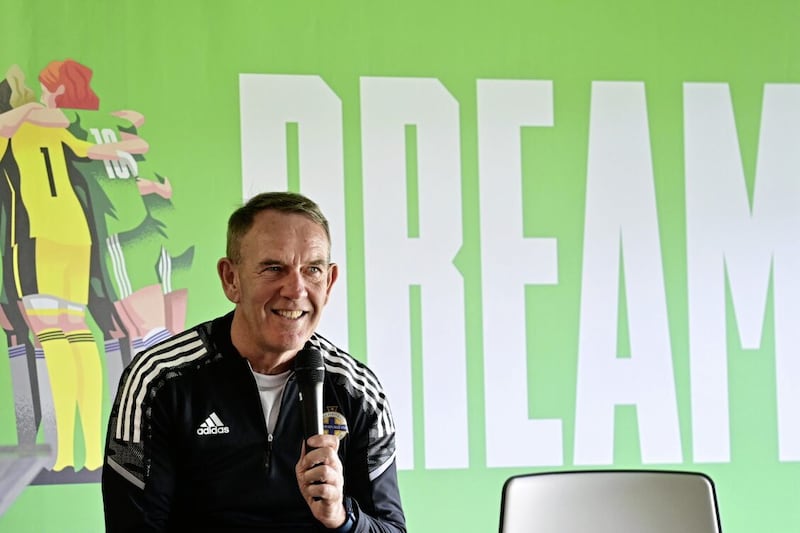DRIVING up standards – and driving onto ferries. That has to be the twin-track approach to continue improving Northern Irish women's soccer after the amazing achievement of reaching Euro 2022.
The first should lead to the second, of course. More and better players will earn more and better moves to clubs in England and Scotland.
Despite all the brilliant coaching and tactical work done by Kenny and Dean Shiels and the top class preparation provided by the rest of the management and backroom teams, NI Women were still bringing a knife to a gunfight at these Women's Euros.
Compare and contrast the club sides of the starting XIs in the opener against Norway:
NI: Unattached; Cliftonville, Cliftonville, Durham, Crusaders, Unattached; Glentoran, Glentoran, Liverpool; Glentoran, Aston Villa.
Norway: Valerenga, Inter, Chelsea, Manchester United, Manchester City; Arsenal, Barcelona; Reading, Barcelona, Chelsea; Lyon.
The two NI girls without clubs at present, goalkeeper Jackie Burns and defender Demi Vance, are fine players, but even their most recent outfits were Danish side BK Hacken and Rangers in Scotland.
The clubs from which England selected the same starting side for their three group victories are top level, like those of the Norwegians:
Man Utd; Barcelona, Chelsea, Arsenal, Houston Dash; Man City, Man City, Chelsea; Man City, Man City, Arsenal. Subs (against NI): Man City, Man Utd, Man Utd, Man City.
NI couldn't possibly be expected to compete with those teams, given that the girls in green included 13 players from NI Women's Premiership clubs – and 10 of those from the current top two, champions Glentoran (4) and leaders Cliftonville (6). The depth of competition is simply not there in that league; not yet.
The Solitude side were among those which stymied Glentoran's attempt to go full-time for this season, so raising the bar will take more time than it arguably should.
England and Scotland aren't the only potential destinations abroad for NI female footballing talent; some of the present squad have been with clubs in Iceland and the USA, with Rebecca Holloway at Racing Louisville in the latter.
However, yet another idiotic aspect of Brexit is that it makes it more difficult for players to secure moves to clubs in the EU.
The positive news is that Shiels has assembled a fairly young squad.
Sure, five of the best-known players are unlikely to feature at the next Euros, if NI were to qualify. The 34-year-old Ashley Hutton has already announced her international retirement, while Rachel Furness is 34, Sarah McFadden, 35, Marissa Callaghan, 36, and Julie Nelson, 37.
Although the likelihood is that Nelson will not be around for long, the brilliant McFadden has taken the gamble of going full-time with Durham, giving up her teaching job at 35.
Clearly, though, gaps will have to be filled at central defence, but otherwise there's a blend of talent and experience which could send out a strong 4-4-2/4-3-3/4-2-4, even with the luckless Simone Magill out long-term due to the ACL injury she sustained against Norway.
The following XI has an average age of under 23:
Jackie Burns (25);
Rebecca McKenna (21), Kelsie Burrows (21), Rebecca Holloway (26) Demi Vance (31);
Lauren Wade (28), Chloe McCarron (24), Joely Andrews (20), Kirsty McGuinness (27);
Kerry Beattie (19), Emily Wilson (20).
Even adding 'Sarah Mac' to that team instead of Burrows would only bring the average age slightly over 24.
Among the other options from the Euros squad are Abbie Magee (21), Laura Rafferty (26), Nadene Caldwell (31), Louise McDaniel (22), Caitlin McGuinness (19), while the back-up goalkeepers Becky Flaherty and Shannon Turner are both only 24.
The luckless Megan Bell and Caragh Hamilton, who were both ruled out by injury, are 21 and 25 respectively; others who came close to going to Southampton were Toni-Leigh Finnegan (19) and Ciara Watling (29).
Obviously what needs to happen is for more young talent to keep coming along, to push those already onto the panel to raise their games.
That work is, and has been, ongoing. Alfie Wylie, who carried the flag for many years, worked tirelessly to improve participation numbers, and captain Callaghan is continuing those efforts in her role with the Irish Football Association.
The IFA deserves credit for the backing it has provided. Money is always tight around Windsor Avenue, but they have given great support. More sponsors will surely get on board, following the excellent lead of Electric Ireland with its GameChangers campaign.
The media will play its part too. Coverage and promotion of the matches is important, but so is critical analysis.
Shying away from any criticism of performances or tactics isn't helpful; indeed, at best it's patronising, at worst it's counter-productive, giving the appearance that below-par displays are acceptable.
On the other hand, expectations must remain realistic. Northern Ireland remains a small talent pool, and soccer – as in the men's game – is competing for athletes with a host of other sports, notably Gaelic games, rugby, hockey, and athletics.
For all the achievements of Kenny Shiels and his players – and they have been absolutely remarkable – moving up levels in the women's game is a slow, hard struggle.
For years NI's world ranking was around the high 50s/ 60 mark.
Shiels has taken them up to 47th, 28th among Uefa nations, with the high-point being 46th.
Realistically, NI aren't even second tier, they are third or fourth tier. Only 16 teams get to the Euros; 32 to the World Cup, with NI unlikely now to qualify for that tournament next year in Australia and New Zealand.
However, the visibility and accessibility of the NI squad, tremendous ambassadors for their home places and for the game, has already encouraged many more young girls to take up soccer.
It will never be easy for any Northern Ireland team to reach a World Cup, or a Euros, but the example of the girls of '22 will live long in the memory – they have blazed the trail for others to follow.







